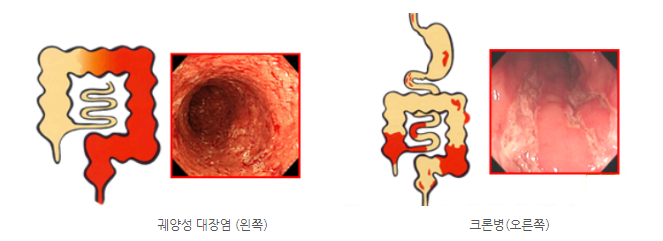2023. 4. 10. 14:30ㆍ건강 이야기
염증성 장 질환(IBD)은 소화관 내벽의 세포들을 자극하여 만성 염증을 일으키는 질환 그룹을 설명하는 데 사용되는 용어입니다. IBD의 두 가지 주요 유형은 크론병과 궤양성 대장염입니다.
IBD의 일반적인 증상으로는 복통과 경련, 설사, 직장 출혈, 체중 감소, 피로, 식욕 부진 등이 있습니다. 이러한 증상은 심각도와 빈도가 다를 수 있으며 시간이 지남에 따라 증상이 반복되어 나타날 수 있습니다.
IBD의 정확한 원인은 알려져 있지 않지만 유전적 요인과 환경적 요인이 복합적으로 관련되어 있는 것으로 생각됩니다. 현재 IBD에 대한 치료법은 없지만 증상을 관리하고 질환이 있는 사람들의 삶의 질을 향상시키는 데 도움이 되는 치료법이 있습니다. 여기에는 염증을 줄이기 위한 약물, 식이 변화 및 경우에 따라 수술이 포함될 수 있습니다.
IBD가 있다고 생각되면 진단 및 치료를 위해 의료 전문가를 만나는 것이 중요합니다. 올바른 관리를 통해 IBD를 가진 많은 사람들이 온전하고 활동적인 삶을 영위할 수 있습니다.

크론씨병은 입에서 항문까지 소화관의 모든 부분에 영향을 미칠 수 있는 염증성 장 질환(IBD)의 한 유형입니다. 일전에 연예인 윤종신씨가 이 병으로 고생하고 있다고 밝인 적이 있었죠. 그것은 소화관 내벽에 염증과 자극을 일으켜 다양한 증상을 유발할 수 있습니다.
크론병의 흔한 증상으로는 복통과 경련, 설사, 체중 감소, 피로, 식욕 부진 등이 있습니다. 다른 증상으로는 발열, 빈혈, 관절통, 피부 발진 등이 있습니다. 이로 인한 합병증으로 장폐쇄, 천공, 대장암 그리고 치루 등 각종 심각한 질환으로 연결될 여지도 있습니다. 이러한 증상은 심각도와 빈도가 다를 수 있으며 시간이 지남에 따라 나타날 수 있습니다.
크론병의 정확한 원인은 알려져 있지 않는 만큼, 크론병에 대한 완치법은 없지만 증상을 관리하고 크론병 환자의 삶의 질을 개선하는 데 도움이 되는 치료법은 있습니다. 장 점막 뿐 아니라 장벽 전체에 염증을 일으키는 질환이어서, 염증을 줄이기 위한 약물, 식이 변화 및 경우에 따라 수술 등 적극적인 치료가 필요할 수 있습니다.

궤양성 대장염은 결장과 직장에 영향을 미치는 염증성 장 질환(IBD)의 한 유형입니다. 그것은 결장 내벽에 염증과 자극을 일으키고 다양한 증상을 유발할 수 있습니다. 크론씨 병과 달리 장점막과 점막하층에만 국한되어 염증이 일어납니다.
궤양성 대장염의 일반적인 증상으로는 크론씨병과 거의 유사합니다. 이러한 증상은 심각도와 빈도가 다를 수 있으며 시간이 지남에 따라 나타날 수 있습니다. 궤양성 대장염은 표면에만 발생하기 때문에 장표면에 발라주는 5-ASA라는 약을 장표면에 발라주기도 하지만, 주로 면역억제제를 많이 사용합니다.
유전적 소인이 있는 환자가 환경적 요인의 영향을 받으면서 이로 인한 면역시스템의 이상을 초래하여 염증성 장질환이 발생하는 것으로 알려져 있습니다. 궤양성 대장염이 있다고 생각되면 의료 전문가를 만나 진단과 치료를 받는 것이 중요합니다.
Inflammatory bowel disease (IBD) is a term used to describe a group of chronic conditions that cause inflammation and irritation in the lining of the digestive tract. The two main types of IBD are Crohn's disease and ulcerative colitis.
Common symptoms of IBD include abdominal pain and cramping, diarrhea, rectal bleeding, weight loss, fatigue, and a loss of appetite. These symptoms can vary in severity and frequency, and may come and go over time.
The exact cause of IBD is not known, but it is thought to be related to a combination of genetic and environmental factors. There is currently no cure for IBD, but there are treatments that can help manage the symptoms and improve quality of life for people with the condition. These may include medications to reduce inflammation, dietary changes, and surgery in some cases.
If you think you may have IBD, it's important to see a healthcare professional for diagnosis and treatment. With the right care, many people with IBD are able to lead full and active lives.
Crohn's disease is a type of inflammatory bowel disease (IBD) that can affect any part of the digestive tract, from the mouth to the anus. It causes inflammation and irritation in the lining of the digestive tract, which can lead to a range of symptoms.
Common symptoms of Crohn's disease include abdominal pain and cramping, diarrhea, weight loss, fatigue, and a loss of appetite. Other symptoms may include fever, anemia, joint pain, and skin rashes. These symptoms can vary in severity and frequency, and may come and go over time.
The exact cause of Crohn's disease is not known, but it is thought to be related to a combination of genetic and environmental factors. There is currently no cure for Crohn's disease, but there are treatments that can help manage the symptoms and improve quality of life for people with the condition. These may include medications to reduce inflammation, dietary changes, and surgery in some cases.
If you think you may have Crohn's disease, it's important to see a healthcare professional for diagnosis and treatment. With the right care, many people with Crohn's disease are able to lead full and active lives.
Ulcerative colitis is a type of inflammatory bowel disease (IBD) that affects the colon and rectum. It causes inflammation and irritation in the lining of the colon and can lead to a range of symptoms.
Common symptoms of ulcerative colitis include abdominal pain and cramping, diarrhea, rectal bleeding, weight loss, fatigue, and a loss of appetite. Other symptoms may include fever, anemia, joint pain, and skin rashes. These symptoms can vary in severity and frequency, and may come and go over time.
The exact cause of ulcerative colitis is not known, but it is thought to be related to a combination of genetic and environmental factors. There is currently no cure for ulcerative colitis, but there are treatments that can help manage the symptoms and improve quality of life for people with the condition. These may include medications to reduce inflammation, dietary changes, and surgery in some cases.
If you think you may have ulcerative colitis, it's important to see a healthcare professional for diagnosis and treatment. With the right care, many people with ulcerative colitis are able to lead full and active lives.
'건강 이야기' 카테고리의 다른 글
| 고혈압의 원인과 치료 (2) | 2023.04.24 |
|---|---|
| 췌장과 관련 질환들 (3) | 2023.04.12 |
| 장 게실과 게실염. diverticulitis (3) | 2023.04.05 |
| 간 이식 (1) | 2023.04.03 |
| 간경변증과 간세포암에 대하여 (0) | 2023.03.31 |